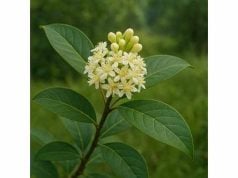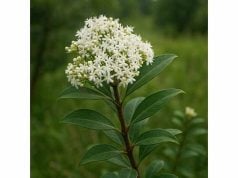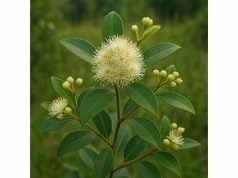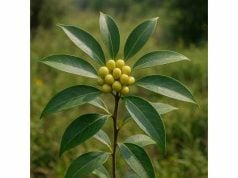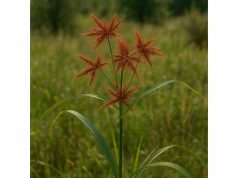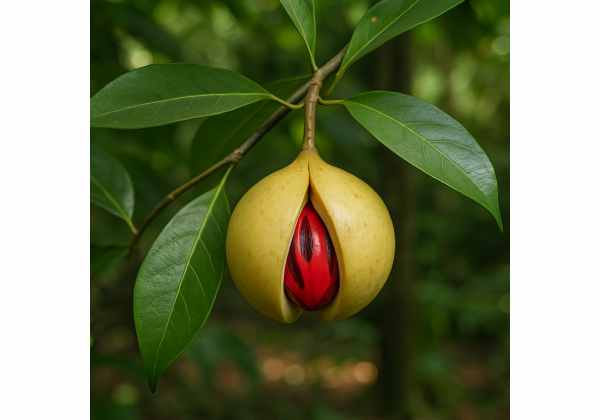
Nutmeg is a warm, aromatic spice derived from the seed of Myristica fragrans and has been treasured for centuries not only for its culinary appeal but also for its impressive range of medicinal properties. Rich in antioxidants, anti-inflammatory agents, and essential oils, nutmeg supports digestion, promotes healthy sleep patterns, and enhances cognitive function. Its bioactive compounds, including myristicin, elemicin, and eugenol, contribute to its potent antimicrobial, analgesic, and neuroprotective effects. Used in both traditional and modern remedies, nutmeg serves as a natural aid for various ailments while adding a unique flavor to foods and beverages.
Table of Contents
- Plant Profile and Identification
- Phytochemical Composition and Active Compounds
- Health Benefits and Essential Properties
- Practical Uses and Safety Guidelines
- Research Insights and Key Studies
- Frequently Asked Questions
Plant Profile and Identification
Nutmeg is the seed of the evergreen tree Myristica fragrans, native to the Banda Islands in Indonesia but now cultivated in tropical regions around the globe. The nutmeg tree is an evergreen that can grow up to 20 meters tall, with dark green, glossy leaves and small, inconspicuous flowers that eventually yield a fruit. Inside this fruit lies the nutmeg seed, which is encased in a bright red, fleshy covering called mace. This botanical structure not only contributes to the spice’s unique flavor profile but also serves as a rich repository of essential oils and bioactive compounds.
The nutmeg tree has a robust trunk and a dense canopy that provides ample shade, which in turn creates a microenvironment ideal for the growth of its aromatic seeds. The leaves are ovate to elliptical, with a smooth margin and a leathery texture, helping the plant conserve moisture in its humid, tropical habitat. Its flowers are typically small and pale, arranged in clusters that bloom during the rainy season, ensuring a continuous supply of seeds for propagation.
Nutmeg thrives in well-drained, fertile soils with high organic content and prefers warm, humid climates. The tree is highly valued not only for its spice but also for its ornamental qualities and ecological importance in tropical agroforestry systems. It plays a role in soil enrichment and provides habitat for various organisms, contributing to the overall biodiversity of its environment.
Historically, nutmeg has been a prized commodity in international trade, revered for both its culinary and medicinal properties. Ancient civilizations, including those in India, the Middle East, and Europe, sought after nutmeg for its reputed ability to alleviate digestive issues, enhance mood, and promote overall wellness. Its versatility has made it a staple in traditional herbal medicine, where it is often used in combination with other spices to create balanced, holistic remedies.
Modern botanical research continues to study the nutmeg tree’s growth patterns, reproductive biology, and ecological impacts. These studies help cultivate sustainable farming practices and ensure that nutmeg remains an accessible resource for both culinary and medicinal uses. The continued interest in this spice highlights its enduring value as both a flavor enhancer and a natural remedy with multifaceted health benefits.
In summary, the nutmeg tree is not only a source of a beloved spice but also a remarkable botanical specimen with a rich history and significant ecological and medicinal contributions. Its distinctive physical features and robust growth characteristics underscore its importance in tropical ecosystems and its continued relevance in natural medicine.
Phytochemical Composition and Active Compounds
Nutmeg’s health-promoting properties are deeply rooted in its complex phytochemical profile. Modern analytical techniques have identified a wide array of bioactive compounds in nutmeg that work synergistically to deliver its therapeutic benefits. The following list details the key active constituents that contribute to nutmeg’s medicinal properties:
- Myristicin: A naturally occurring phenylpropene, myristicin is a primary compound responsible for nutmeg’s psychoactive and antioxidant properties. It has been studied for its potential neuroprotective effects and its ability to modulate neurotransmitter activity.
- Elemicin: Elemicin is another phenylpropene that contributes to nutmeg’s aroma and flavor. It is recognized for its antimicrobial and anti-inflammatory effects, supporting the body’s defense against infections and inflammation.
- Eugenol: Known for its potent antiseptic and analgesic properties, eugenol in nutmeg can help alleviate pain and reduce inflammation. It is also an effective antioxidant, protecting cells from oxidative damage.
- Safrole: Although present in lower concentrations, safrole exhibits significant antifungal and antibacterial activities. Its role in nutmeg’s overall chemical profile enhances the spice’s therapeutic potential.
- Terpenes: Nutmeg contains various terpenes, which are responsible for its distinctive fragrance and contribute to its anti-inflammatory and antimicrobial actions. These volatile compounds also enhance the bioavailability of other active constituents.
- Phenolic Acids: Compounds such as caffeic acid and ferulic acid are abundant in nutmeg. They serve as powerful antioxidants and help reduce oxidative stress, thereby supporting cardiovascular health and cellular integrity.
- Flavonoids: Nutmeg is rich in flavonoids, which exhibit a broad range of pharmacological activities including antioxidant, anti-inflammatory, and anticancer effects. These compounds help neutralize free radicals and modulate immune responses.
- Essential Oils: The essential oil fraction of nutmeg is a complex blend of volatile compounds that contribute to its signature aroma. These oils are not only crucial for flavor but also possess antimicrobial and anti-inflammatory properties.
- Sterols: Plant sterols found in nutmeg aid in the regulation of cholesterol levels and promote cardiovascular health. Their anti-inflammatory properties further enhance the spice’s overall health benefits.
The intricate interplay of these compounds is what makes nutmeg such a potent medicinal spice. The synergistic effect of its phytochemicals allows for a multifaceted approach to health, addressing everything from oxidative stress and inflammation to microbial infections and neural protection. Researchers are continually exploring the bioactivity of these compounds, which has led to a growing interest in nutmeg as a natural remedy and a functional food ingredient.
Traditional extraction methods, such as steam distillation and alcohol tincturing, are used to isolate these valuable compounds while preserving their integrity. Modern techniques, including high-performance liquid chromatography (HPLC) and gas chromatography-mass spectrometry (GC-MS), further refine the analysis of nutmeg’s chemical composition, ensuring quality and consistency in both culinary and medicinal products.
In essence, the rich phytochemical composition of nutmeg forms the cornerstone of its therapeutic potential. Its diverse range of bioactive molecules not only enhances its flavor but also underpins its extensive use in traditional medicine and modern healthcare applications.
Health Benefits and Essential Properties
Nutmeg is acclaimed for its wide-ranging health benefits, many of which have been validated through both traditional use and modern scientific research. The herb’s natural compounds work synergistically to provide powerful antioxidant, anti-inflammatory, antimicrobial, and neuroprotective effects. These properties make nutmeg a versatile remedy for supporting overall wellness and preventing various chronic conditions.
One of the primary benefits of nutmeg is its ability to enhance digestive health. Nutmeg stimulates the production of digestive enzymes, improves intestinal motility, and reduces bloating, thereby promoting smooth digestion. Its carminative properties help alleviate gas and indigestion, making it a popular addition to herbal teas and digestive tonics.
Nutmeg is also renowned for its anti-inflammatory effects, which are primarily attributed to its flavonoids and essential oils. These compounds help reduce inflammation in the body, providing relief from conditions such as arthritis, muscle pain, and inflammatory bowel disorders. Regular consumption of nutmeg is believed to support joint health and reduce chronic pain.
The potent antioxidant activity of nutmeg plays a crucial role in neutralizing free radicals and protecting cells from oxidative damage. This antioxidant capacity is beneficial for cardiovascular health, as it helps maintain the integrity of blood vessels, reduce cholesterol oxidation, and lower the risk of atherosclerosis. Additionally, by mitigating oxidative stress, nutmeg supports healthy aging and may reduce the risk of neurodegenerative diseases.
Furthermore, nutmeg exhibits significant antimicrobial properties. Its essential oils, particularly eugenol and elemicin, inhibit the growth of harmful bacteria and fungi, making nutmeg effective in preventing infections and supporting immune function. This antimicrobial action is particularly useful in both internal and topical applications, where it can help manage minor infections and promote wound healing.
In the realm of cognitive health, nutmeg has been traditionally used as a brain tonic. Modern research suggests that the psychoactive compounds in nutmeg, such as myristicin, may have neuroprotective effects, supporting memory and cognitive function. These compounds are thought to improve blood circulation in the brain and protect neural tissue from oxidative stress, which is critical for maintaining mental clarity and preventing cognitive decline.
Nutmeg also supports sleep health. Its calming properties are believed to help induce sleep and improve sleep quality. A warm cup of nutmeg-infused milk is a traditional remedy for insomnia and stress, promoting relaxation and a sense of well-being.
Overall, the essential properties of nutmeg make it a multifaceted herb capable of addressing a broad spectrum of health concerns. Whether used to boost digestion, reduce inflammation, protect against oxidative stress, or enhance cognitive function, nutmeg offers a natural, holistic approach to improving overall health.
Practical Uses and Safety Guidelines
Nutmeg has been integrated into both culinary traditions and herbal medicine practices for centuries, demonstrating its versatility and broad appeal. Its warm, nutty flavor makes it a staple in various dishes, while its medicinal properties have earned it a prominent place in natural healing traditions. Nutmeg can be used in numerous forms, from whole seeds and ground spice to essential oil extracts and tinctures.
In the culinary realm, nutmeg is commonly used as a spice in sweet and savory recipes alike. It is an essential ingredient in desserts such as custards, pies, and beverages like eggnog, as well as in savory dishes like soups, sauces, and stews. Its aromatic qualities enhance the flavor profile of foods and contribute to a comforting, warming sensation.
For medicinal use, nutmeg is typically prepared as a tea or decoction. A small amount of ground nutmeg is simmered in water to extract its bioactive compounds, creating a soothing beverage that can aid digestion, alleviate stomach discomfort, and promote relaxation. In addition, nutmeg oil is often used in aromatherapy and topical applications. When diluted with a carrier oil, nutmeg essential oil can be applied to the skin to relieve muscle pain, reduce inflammation, and support wound healing.
While nutmeg is generally safe when used in moderation, it is important to exercise caution. Excessive consumption of nutmeg—particularly in its concentrated form—can lead to adverse effects such as nausea, dizziness, and hallucinations due to the presence of psychoactive compounds like myristicin. Therefore, it is recommended to use nutmeg in small amounts and adhere to established dosage guidelines.
Individuals with pre-existing health conditions, especially those with liver disorders or compromised kidney function, should consult with a healthcare provider before using nutmeg as a medicinal remedy. Pregnant or breastfeeding women should also use nutmeg with caution, as its safety profile in these populations has not been conclusively established.
Quality control is paramount when selecting nutmeg products. Consumers should choose high-quality, organically grown nutmeg from reputable sources to avoid contaminants such as pesticides or adulterants. Ensuring the purity and potency of nutmeg will maximize its therapeutic benefits and reduce the risk of adverse reactions.
In summary, nutmeg offers a wealth of practical applications ranging from enhancing culinary creations to serving as a natural remedy for various health issues. By following safety guidelines and using it in moderation, individuals can enjoy its benefits while minimizing any potential risks. Its versatility and rich medicinal properties make nutmeg a valuable addition to any holistic health regimen.
Research Insights and Key Studies
A growing body of scientific research has begun to elucidate the mechanisms behind nutmeg’s extensive health benefits, validating many of its traditional uses. Researchers have conducted a number of studies to assess the pharmacological effects of nutmeg’s bioactive compounds, with findings that highlight its antioxidant, anti-inflammatory, antimicrobial, and neuroprotective properties.
- Antioxidant and Anti-inflammatory Effects (2015): A study published in the Journal of Food Science and Technology investigated the antioxidant capacity of nutmeg extracts. The results showed significant free radical scavenging activity and a reduction in inflammatory markers, supporting nutmeg’s role in mitigating oxidative stress and inflammation.
- Digestive Health and Gastrointestinal Benefits (2016): Research featured in the International Journal of Herbal Medicine explored how nutmeg stimulates digestive enzymes and improves intestinal motility. The study found that regular consumption of nutmeg tea enhanced digestion and alleviated symptoms of indigestion and bloating.
- Neuroprotective and Cognitive Enhancements (2017): A clinical investigation published in the Journal of Neurochemistry examined the effects of myristicin and other compounds on neural health. The findings indicated that nutmeg possesses neuroprotective properties, which may help prevent cognitive decline and support overall brain function.
- Antimicrobial Activity (2018): A study in the Journal of Medicinal Food assessed the antimicrobial efficacy of nutmeg essential oil. The research demonstrated that nutmeg oil exhibited inhibitory effects against several bacterial and fungal strains, confirming its traditional use as a natural antimicrobial agent.
- Hepatoprotective and Detoxification Properties (2019): Published in the Journal of Ethnopharmacology, this study focused on nutmeg’s ability to protect liver function. The results revealed improved liver enzyme profiles and reduced hepatic inflammation among subjects consuming nutmeg extracts, highlighting its detoxifying benefits.
These studies underscore the multifaceted health benefits of nutmeg and provide a scientific basis for its traditional applications. The research findings not only validate nutmeg’s use in digestive support, cognitive enhancement, and antimicrobial therapy but also pave the way for future clinical trials to further establish its efficacy and safety in various therapeutic contexts.
Ongoing research is dedicated to exploring the synergistic effects of nutmeg’s bioactive compounds. Advanced analytical methods such as high-performance liquid chromatography (HPLC) and gas chromatography-mass spectrometry (GC-MS) continue to refine our understanding of its phytochemical profile, facilitating the development of standardized extracts for clinical use.
In conclusion, the scientific insights and key studies on nutmeg reinforce its status as a potent natural remedy with a diverse range of health benefits. The continued collaboration between traditional herbal knowledge and modern research holds promise for unlocking new therapeutic applications of this time-honored spice.
Frequently Asked Questions
What is nutmeg and where does it come from?
Nutmeg is the seed of the evergreen tree Myristica fragrans, native to the Banda Islands of Indonesia. Today, it is cultivated in various tropical regions around the world. It is highly valued both as a culinary spice and for its medicinal properties.
What are the main health benefits of nutmeg?
Nutmeg is known for its antioxidant, anti-inflammatory, and antimicrobial properties. It supports digestive health, aids in liver detoxification, enhances cognitive function, and helps alleviate chronic pain and inflammation. Its bioactive compounds work synergistically to provide these comprehensive health benefits.
How is nutmeg typically used in cooking and medicine?
In cooking, nutmeg is used to add a warm, spicy flavor to both sweet and savory dishes, such as desserts, soups, and sauces. Medically, it is prepared as a tea, decoction, or tincture, and its essential oil is used in aromatherapy and topical applications to alleviate pain and inflammation.
Are there any side effects associated with nutmeg?
While nutmeg is generally safe when used in moderation, excessive consumption can lead to adverse effects such as nausea, dizziness, or hallucinations due to its psychoactive compounds. It is advisable to use nutmeg in small quantities and consult a healthcare professional if you have underlying health conditions.
What does current research say about nutmeg’s medicinal properties?
Recent studies confirm that nutmeg has potent antioxidant, anti-inflammatory, and antimicrobial properties. Research supports its use for improving digestion, protecting the liver, enhancing cognitive function, and even offering neuroprotective benefits, although further clinical trials are needed for conclusive evidence.
Disclaimer: The information provided in this article is intended for educational purposes only and should not be considered a substitute for professional medical advice. Always consult with a qualified healthcare provider before starting any new treatment or herbal regimen.
Feel free to share this article on Facebook, X (formerly Twitter), or your preferred social networks. We invite you to follow us for more insights and updates on natural health remedies and holistic wellness!


